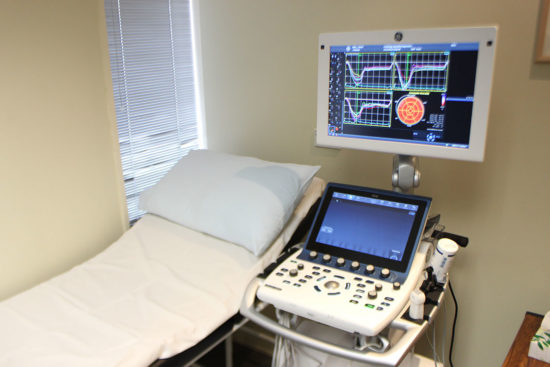High Blood Pressure
We can help.
At Cardiology Specialists, Dr Dougal McClean can investigate whether you have high blood pressure and if it needs treatment to prevent risk of stroke.
Symptoms
Some patients feel their heart pounding, or feel dizzy, but most patients do not have symptoms of high pressure.
Causes:
In over 90% of cases high blood pressure is caused by stiffening of the main arteries around the body and there may be a family history of hypertension. “White Coat” blood pressure may be a risk factor for stroke. Dr Dougal McClean specialises in difficult to control blood pressure.
Investigations:
24 Hour Ambulatory Blood Pressure Monitor (BP Monitor)
The 24 hour Blood Pressure Monitor at Cardiology Specialists uses a blood pressure cuff connected to a portable recorder to measure blood pressure at different times over 24 hours. 24 hour BP Monitor can assess “white coat” hypertension, and whether blood pressure decreases normally in the evening. Blood Pressure recordings can be compared to different patient activities using an iPhone app, or diary. Recent studies have shown that patients with white coat hypertension have a higher incidence of vascular events including strokes and heart attacks. Patients with high blood pressure (hypertension) can become “reverse dippers” where blood pressure is higher in late afternoon/evening compared to morning.
Echocardiography
 Echo at Cardiology Specialists uses ultrasound to measure function of heart chambers and heart valves. Echo is also called Cardiac Ultrasound, which uses high frequency sound waves and is similar to a gall bladder or pregnancy ultrasound but is instead focused on the heart. Professor Hamid Ikram pioneered the introduction of Echo to Canterbury. At Cardiology Specialists, Echo is performed by a specially trained technician who moves a plastic transducer on the skin of the chest wall to obtain pictures of the heart chambers and valves. Echo (cardiac ultrasound) is useful for diagnosing features of hypertensive heart disease including thickening of the heart muscle (left ventricular hypertrophy), impaired relaxation of heart muscle, dilated and weakened heart muscle, dilated aorta and filling chambers (atrium), and heart murmurs. Left ventricular hypertrophy (LVH) is an independent risk factor for stroke and heart attack.
Echo at Cardiology Specialists uses ultrasound to measure function of heart chambers and heart valves. Echo is also called Cardiac Ultrasound, which uses high frequency sound waves and is similar to a gall bladder or pregnancy ultrasound but is instead focused on the heart. Professor Hamid Ikram pioneered the introduction of Echo to Canterbury. At Cardiology Specialists, Echo is performed by a specially trained technician who moves a plastic transducer on the skin of the chest wall to obtain pictures of the heart chambers and valves. Echo (cardiac ultrasound) is useful for diagnosing features of hypertensive heart disease including thickening of the heart muscle (left ventricular hypertrophy), impaired relaxation of heart muscle, dilated and weakened heart muscle, dilated aorta and filling chambers (atrium), and heart murmurs. Left ventricular hypertrophy (LVH) is an independent risk factor for stroke and heart attack.
Treatment
You will need to make lifestyle changes with increasing exercise and losing weight. There are various blood pressure medication and it is important that the correct medication for you is effective in reducing the blood pressure to normal levels without side effects.
